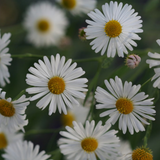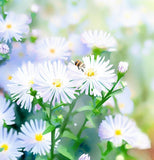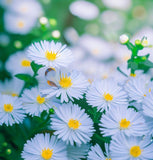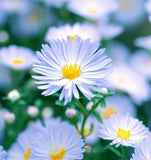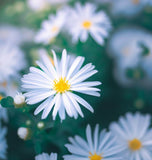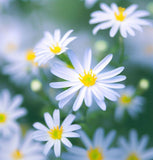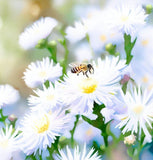BOLTONIA asteroides (False Aster)
BOLTONIA asteroides (False Aster) is a herbaceous perennial plant native to North America. It belongs to the Asteraceae family and is closely related to asters and sunflowers. The plant typically grows up to 4 feet (1.2 meters) tall and has a bushy, spreading habit with numerous upright stems.
Plant with horizontal stems covering the ground by spreading over the maximum surface area gives the look of fairy standing in field. Daisy like flower heads with white and lavender rays! Boltonia-asteroides are easily grown with seeds. Yellow center disks promote pollination by attracting nectar searching birds. Wet places, like wet meadows and marshal areas are preferable growth places for them.
The flowers of False Aster are produced on long, slender stems that rise above the foliage. The flowers are typically white and have numerous ray florets that surround a central disk. They bloom from mid-summer to fall and are an important nectar source for bees, butterflies, and other pollinators.
False Aster prefers full sun to partial shade and moist, well-draining soil. It is a hardy plant and can tolerate drought and poor soil conditions. The plant is often used in naturalized settings, meadows, and prairies, and it can be propagated by seed or division.
In addition to its ornamental value, False Aster has a long history of medicinal use by various Native American tribes. The plant has been used to treat a variety of ailments, including headaches, fevers, and respiratory problems. It is also used in traditional herbal medicine as a diuretic and laxative.
| Number of Seeds | Max Coverage Area (Square Ft.) | |
|---|---|---|
| 0.5OZ | 131,250 | 2,000 |
| 1OZ | 262,500 | 4,000 |
| 1/4LB | 1,050,000 | 16,000 |
| 1/2LB | 2,100,000 | 32,000 |
| 1LB | 4,200,000 | 64,000 |
| 5LB | 21,000,000 | 320,000 |
Scientific Name: Boltonia Asteroides
Common Name: False Aster, False Chamomile
Plant Type: Perennial
Family: Asteraceae
Native Range: United States, Canada
Full Growth Height: 5-6 ft
Width in Across: 2-4 ft
Zone: 3 to 10
Exposure: Full Sun
Blooming Season: Summer (Mid, Late), Fall.
Flower: Cut Flowers Nectar disc at Center
Attracts: Butterflies
Flower Color: White
Tolerate: Clay Soil
Water Requirement: Low, Average
Soil Type: Sand, Loam, Clay
Gardening Use: Beds, Borders, Riversides








